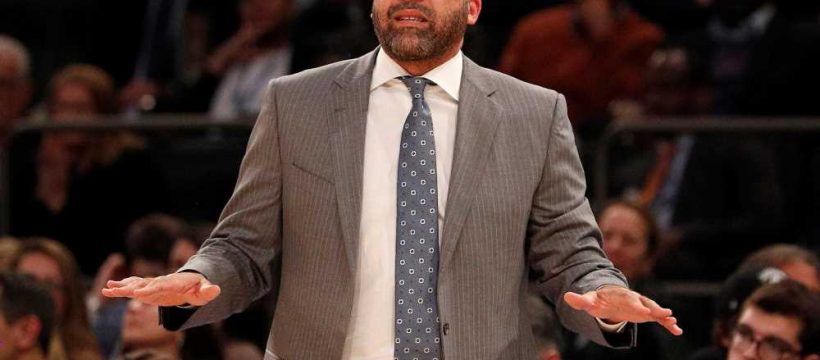More On:
David Fizdale
David Fizdale doesn’t see perfect Chris Paul-Knicks fit
Fired Knicks coach is having a happy ending to ‘crazy year’
The case for the Knicks keeping Mike Miller next season
Knicks point guard’s roller-coaster run seems to be over
After he was fired as head coach of the Knicks in December 2019, David Fizdale lost himself.
“I really was at the lowest place I’ve ever been from a mental health standpoint,” he said about the aftermath of his firing in an interview with The Undefeated, published Thursday.
The Knicks parted ways with Fizdale, who initially signed a five-year, $22 million contract, following a 4-18 record to start the 2019-20 season. He went 17-65 in his 2018-19 debut season as head coach in New York, which marked the worst record in the league.
The team brought on Fizdale to lead a “patient build” that included creating a winning culture within the then-struggling storied franchise — which took a playoff-clinching turn under current head coach Tom Thibodeau this season.
The Knicks are still responsible for the three-plus years and $17 million in Fizdale’s hire-gone-wrong.
“I thought the lowest point was during the losses,” Fizdale recalled, noting that his most difficult time was when he experienced self-doubt.
“But it was after, when you go through the whole part of, ‘What could I have done different? Did I even deserve this job?’ You think like you were an imposter. You felt like you got over on these people. You’re a fraud.”
Upon taking the Knicks head coaching job in 2018, Fizdale said, “I always thought, whoever you give me, I can win with them. I’ll figure it out. That’s how arrogant I was.”
At the time, Fizdale had a roster that just didn’t fit.
After the Knicks came up short in free agency in 2019, GM Scott Perry and then president Steve Mills signed all free agent power forwards – Taj Gibson, Bobby Portis Jr. and Marcus Morris – to join Julius Randle.
The young roster was filled with one-year deals and rookie contracts with no blueprint for longevity. And Fizdale’s point guards at the time, Elfrid Payton, Dennis Smith Jr. and Frank Ntilikina, all struggled to shoot from 3-point range.
While reflecting on the roster in New York, Fizdale expressed regret with how he handled his relationships with players.
“I loved them, and probably a big part of me wanted them to love me back. I had a very hard time disconnecting from the human being in them. And so I found myself in a conundrum. It was eating me alive every day,” he explained.
“I probably was too nice to those guys. I was too wrapped up in what would happen to them if they didn’t play. It was basically the opposite of what I did wrong in Memphis.”
Fizdale described his coaching style in Memphis, specifically with then-franchise star Marc Gasol, as ego-filled and tough.
“I tried to coach Marc Gasol like I coached kids from the ‘hood, but I hadn’t gained enough trust from him. I coached him how my high school coach would have coached me, where I tried to tear his ego down to the barest bones in front of the group,” Fizdale explained. “I got caught up in my own ego and my emotions, because I was so frustrated with the losing.”
He later added, “What [Memphis] taught me is I can still coach guys hard, but I have to know the level I can go to. I have to coach them with the idea that it’s bigger than basketball.”
After doing some soul-searching while away from basketball for a year and a half, Fizdale has adopted a fresh perspective on his coaching abilities.
The 43-year-old told The Undefeated he now feels prepared to return to coaching in the NBA. He said he is ready to take on either a lead assistant coaching position — or even one of the five head-coaching jobs available with the Mavericks, Blazers, Pelicans, Magic and Wizards.
Coaching vacancies in Boston and Indiana were just filled. The Post recently confirmed the Celtics are finalizing a deal to name Nets assistant Ime Udoka as their new head coach. On Thursday, former Mavericks coach Rick Carlisle confirmed he inked a four-year, $29 million deal to return as head coach of the Pacers.
“I think I’m at a place now that I see purpose in what I do. A deeper purpose,” Fizdale said. “I want to come back to the game with my mind totally on service — service without means to an end. I’ve never coached that way before.
“It ain’t about me no more. I’m coaching to help this kid get better, and I don’t care if I get credit or not. It’s about my time with this kid and providing the space he needs to improve as a man, and as a player. And that’s it.”
Fizdale said he’s never felt happier coaching than he does now.
“I really haven’t, because I didn’t understand. I was always chasing this image that everybody else told us we had to be. I was always chasing to be [Gregg Popovich] or Pat [Riley]. Could I catch them in wins? Could I be a Hall of Famer? I was always chasing this invisible GOAT. But I think people abuse the word ‘competitor.’ You can still be a monster competitor without your life hinging on it.”
As for how he plans to win in today’s NBA if given an opportunity to coach?
“I’m just going to keep leaning into the idea of being a human first and being a coach second and see where that takes me,” Fizdale said.
“That’s where I think I’ll find winning.”
Share this article:
Source: Read Full Article



